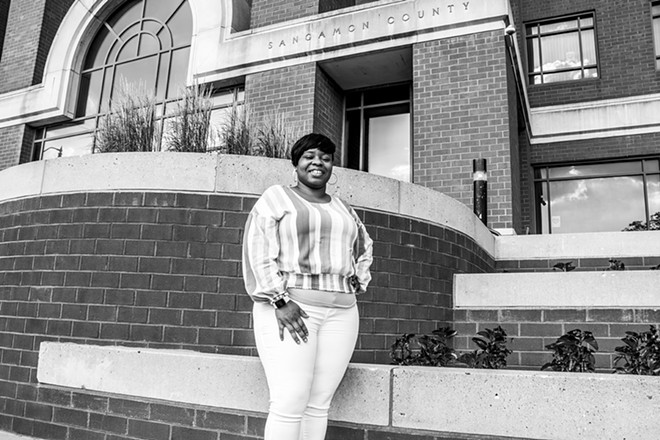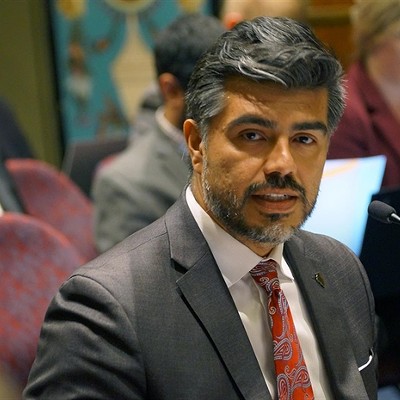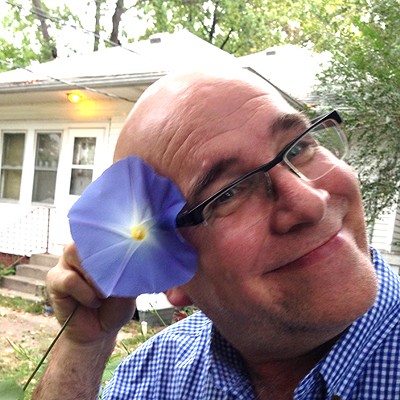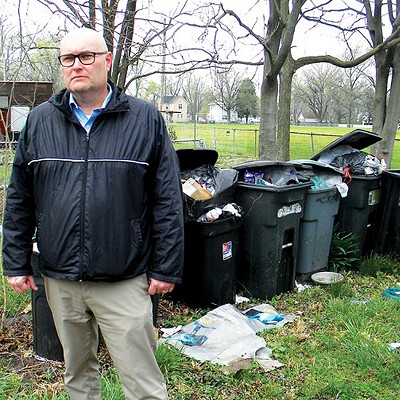
Khoran Readus puts the "active" in activism. In 2019 she took a job with Sojourn Shelter as a Sangamon County court advocate for survivors of domestic abuse. Previously she spent more than 15 years as a domestic violence advocate for the Sangamon County state's attorney. She has four daughters, a son and a grandchild she helps raise. Her family has a history of social justice work in Springfield. Her uncle is Mbanna Kantako, an internationally known host and founder of the pirate radio station, Human Rights Radio.
Readus co-founded Black Lives Matter Springfield with Sunshine Clemons in 2016 after the police killings of Philando Castile and Alton Sterling, among others, and serves as its vice president. Readus founded the Brown Bag Summer Food Program the same year. She serves on the state's Black History Curriculum Task Force. She's also on the board of Equity Legal Services, Inc. – a nonprofit that provides free legal services to low-income people. The following excerpts are from an interview with Illinois Times and have been edited for clarity and brevity.
On growing up in Springfield
My family moved to Springfield shortly after my mom was born in 1961. My grandmother worked for the Springfield Housing Authority for years. She and my grandfather had 11 children. My mom was pretty much a single mother. She had four kids, we grew up in the projects – the John Hay Homes. My mom did social work, she worked at Contact Ministries for a while, she also worked at the Urban League. When I was in fifth grade we moved to South Grand and 13th Street, which was an upgrade at that time. I got my GED around 1999, and I've always worked two or three jobs. I've been braiding hair since I was 15, so that's been my side hustle. After getting my GED I enrolled in business classes to learn clerical skills.
On working for the Sangamon County state's attorney
When I was 20 I started working for Horace Mann and a job opened up at the Sangamon County state's attorney's office, and someone recommended me. I started there in 2000 as a traffic clerk, and then a felony secretary and then a position for a domestic violence advocate opened up and I did that for about 15 years, until last year. There I would be the person to actively listen to a victim while someone from the state's attorney's office decided if there was enough to file criminal charges. I was one of the only – if not the only – Black person working there. It gave me an opportunity to see the reasons why we have racial disparities in the criminal justice system. I took on the role of informing the attorneys working on these cases of cultures other than their own. I felt like in that office I was the Black voice, the low-income voice. I could read a report and see something totally different, or sitting in on a conversation I would hear something different than what the attorneys heard.
I didn't really find my voice until after speaking with a Black assistant state's attorney from Chicago, and telling him I didn't feel like I fit in. He told me I was there for a reason, to give them that different perspective. And so I gave it to them. And I reminded them these police reports were coming from people, and there are biased and racist police officers who target people of color. I found myself also saying we need to think about the suspect and his life after these charges. There's a lot of cultural diversity training that needs to take place for there to be a better understanding of who these clients and defendants are.
On higher education
I got my master's degree in social work at University of Illinois Springfield in 2019. I initially wanted to go into psychology because I wanted to help people. Professor Kay McChesney suggested I go into social work. She said you can help individuals, families, organizations – there are a variety of jobs. So I switched my major. All of my UIS professors in social work were white. McChesney was my only in-person female professor. Learning from her, there were constant light bulbs going on about things I had experienced in life, like learning about microaggressions and how exhausting they can be. I realized I was not alone in experiencing these things.
Those professors did an amazing job. They encouraged uncomfortable conversations, like conversations about white privilege, which could be touchy. Some students would get defensive, but the teachers used those instances as an example of how we're not all going to agree, but you have to listen respectfully to ever reach a place of understanding. McChesney's cultural diversity class is where I learned things about Black history that I hadn't yet learned in school – for instance, how my grandfather who was in the military probably came back home and wasn't given the resources that a white counterpart got. She showed us why things are the way they are. Knowing those things is crucial.
On hopes for Springfield
For many Black people there is a lack of opportunities because so much in Springfield is about who you know. Racial profiling, discrimination and a lack of resources play major roles in why you don't see more Black people thriving. My mom was a hard worker, she got paid the bare minimum, there was often no room for advancement, which was my own experience. Upward mobility is something Black people often aren't aware of and don't get a chance at.
We all have to actively listen to and respect each other in order to make any changes. I just need everybody to be honest. We need to encourage uncomfortable conversations where people can get a better understanding of where others are coming from and plant seeds for growth and awareness.
There have been Black women and men killed by police for so long. Seeing so many people at the Black Lives Matter car procession we had, including white people, it was a reminder that we're not alone. I know a lot of people in the Black community are feeling hopeless, but I really feel hope that some big changes are going to occur. My goal is for us to use this momentum to unite and work together.
You can contact Rachel Otwell at [email protected].

















